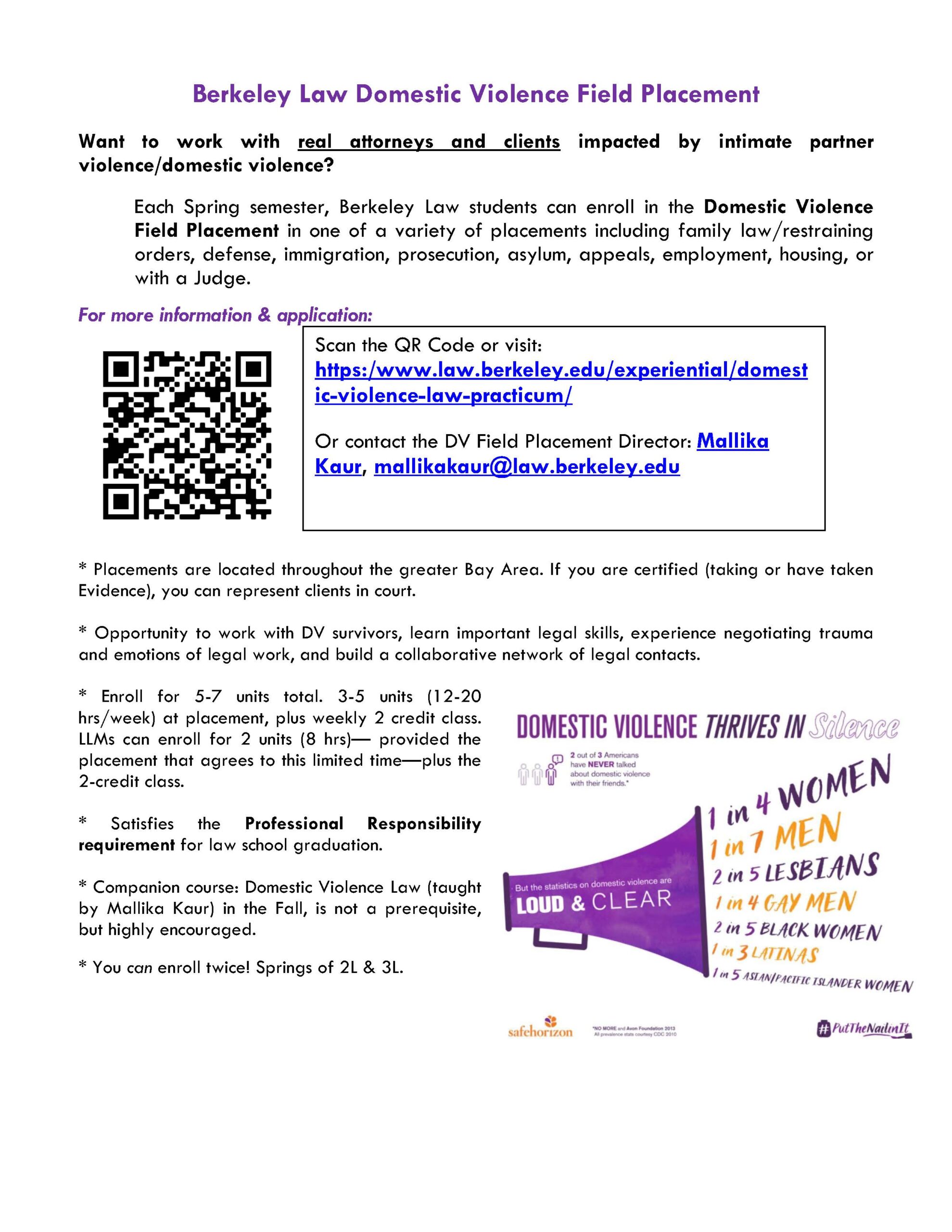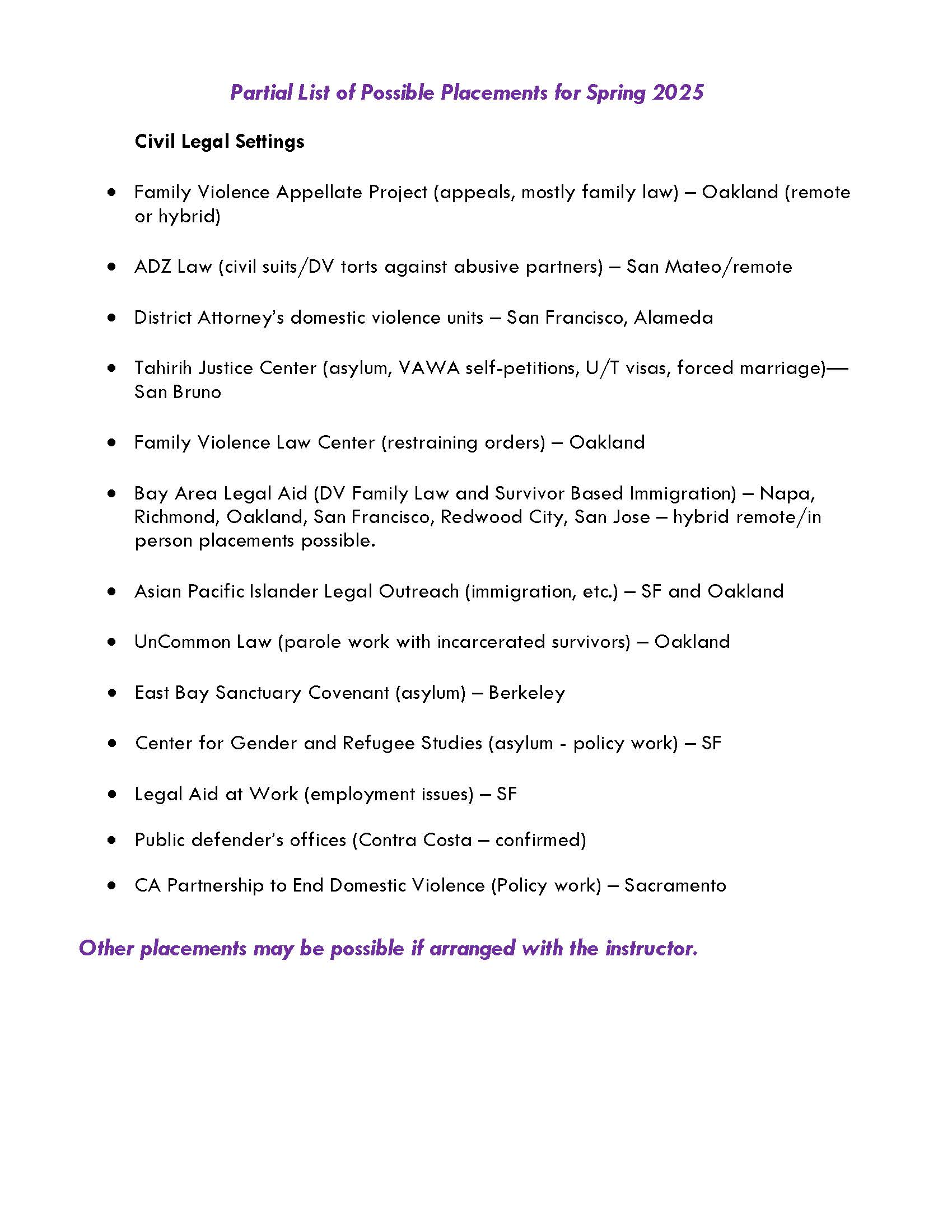Students work on real cases and policies, supervised by attorneys in a range of practice areas at various agencies in the Bay Area, while enrolled in a classroom component taught by Domestic Violence (DV) Field Placement Director Mallika Kaur.
Students gain real-time legal and policy training; manage trauma-exposure; and learn about gendered dynamics that touch all areas of law. It is very likely that, during their career, all attorneys will– either knowingly or unknowingly–work with and/or represent someone victimized by or someone accused of DV. When millions of people in the U.S. report being victimized by DV each year, it is clear that the legal needs of DV survivors are as diverse as our population. Overlay this with the reality that the use of the law to combat DV in the U.S. is deeply debated today. The DV Field Placement program is a chance for students to immerse in issues at the intersection of law and gender asymmetries: race, immigration, state’s rights, policing, restorative justice, and more.
In the U.S., DV is often reported as the leading cause of unnatural death for women. Heightened danger and lethality in various marginalized communities, including of trans victim-survivors, remain understudied. In U.S. prisons, it is estimated that anywhere from 40-85% of the population serving time in women prisons have been directly impacted by DV. Of mass shootings across the U.S., 2 out of 3 have a connection to DV. In many police precincts across the country, DV is the single largest category of calls to the police. And in the civil space, there is growing new legislation around DV: tort law, labor law, health law, housing law, bankruptcy law, etc., all directly intersect with the needs of DV survivors.
Students join the DV Field Placement program to develop first-hand insight to DV in their chosen legal area as well as benefit from the percolation of ideas and discussions about ethics-in-action in the DV Field Placement seminar, where fellow students will bring their learning (cognitive, emotional, technical, and philosophical) from working on DV issues in other diverse areas.
The DV Field Placement is open to any student, regardless of past or future goals and experiences.
Students may choose a placement at one of various agencies in the Bay Area. The work focuses on restraining orders, family law, public benefits, immigration, asylum, tort actions, employment issues, prosecution, defense of accused and/or incarcerated victims, appellate work, or other issues involving domestic violence. Students also may work on policy matters, including helping draft and advocate for legislation.
At the placements, students interview clients; draft restraining orders, memoranda, and motions; represent clients at hearings; argue motions; and research policy issues. They may also attend meetings with attorneys, government officials, judges and legislators.
The placements provide a rewarding opportunity to engage with victim-survivors of Domestic Violence, to witness the laws around DV in action, to learn important legal skills, to experience negotiating trauma and emotions of legal work, and to build a collaborative network of contacts in the legal community.
Apply for Spring 2025 DV Field Placement. For questions contact mallikakaur@law.berkeley.edu.
- DV Field Placement meets Professional Responsibility requirement
- DV Field Placement meets J.D. Experiential Requirement
- DV Field Placement counts towards LLM Practical Lawyering Certificate
Here is the PDF for the Domestic Violence Field Placement Flyer (above).
THE JIM FAHEY SAFE HOMES FOR WOMEN FELLOWSHIP
The Jim Fahey Safe Homes Fund for Women endowment was established in 2007 to provide scholarships for graduate students at UC Berkeley with demonstrated financial need and a strong aptitude in relevant subjects as well as a deep commitment to combating domestic violence against women. Preference is given to students who are close to graduation, and who have completed coursework on feminist or gender or women’s studies, families, domestic violence, and the like. Undocumented students are eligible to apply for the fellowship. No work authorization required.

